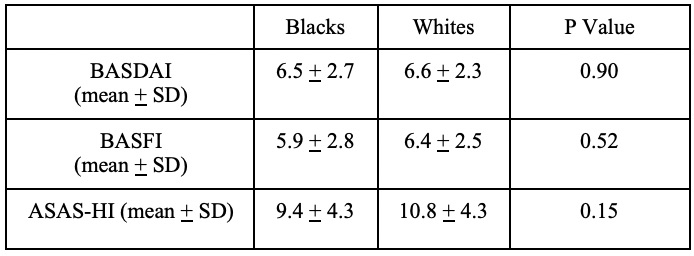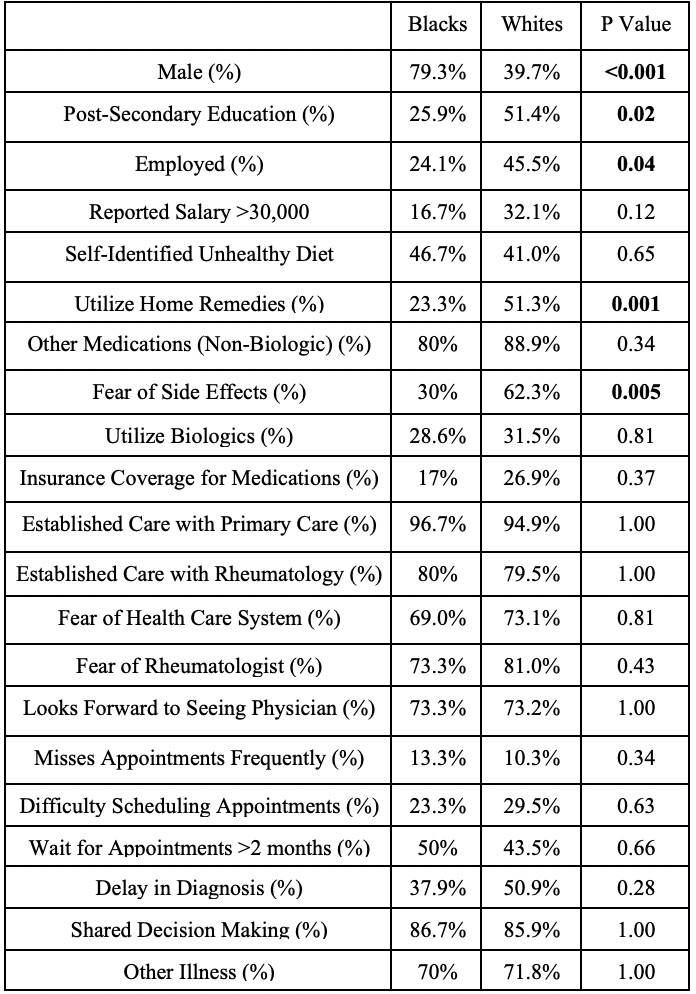Session Information
Session Type: Poster Session A
Session Time: 9:00AM-11:00AM
Background/Purpose:
To confront the persistent racial and ethnic disparities in health outcomes in the United States, it is imperative to study cultural and socioeconomic differences as potential contributors of worse disease severity among Black patients with AxSpA. In this two-phase, cross-sectional survey study, we aimed to identify differences in cultural, socioeconomic factors, and education levels among the Black and White patients with AxSpA in the United States.
Methods:
The first phase consisted of qualitative research to develop a questionnaire. A focus group including Black patients with AxSpA was convened at an urban medical center to investigate participants’ knowledge about SpA symptoms, disease course, and barriers to management of the disease. The focus group was audio-recorded, transcribed, and the feedback obtained was tabulated for trends. The survey content was generated using feedback from the focus group. Phase two of the study involved the distribution of the survey in person in a single rheumatology practice and nationwide electronically via social media (Facebook) and search engine marketing (Google search pages). The survey assessed respondent’s demographics, understanding of their disease, educational level, income level, employment status, information about medication use including biologic use, availability of primary and specialty care, shared decision-making, cultural and family influences, and trust of the medical system. Categorical variables were analyzed with Fischer’s Exact Test and ordinal variables with the Kruskal-Wallis Test. All tests were two-sided, with p< 0.05 considered significant.
Results:
A total of 120 surveys were completed (62.5% web-based, 37.5% in person). The total was was composed of 65% White participants with a mean age 51.9 ± 13.0 years, 25% Black participants with a mean age 56.3 ± 11.1 years, and 10% other. The mean BASDAI, BASFI, and ASAS HI among the two groups were not different as shown in Table 1. Black patients were less likely to have a post-secondary education (25.93% vs. 51.35%, P=.0256), be employed (24.14% vs. 45.45% p=.0491), use home remedies (23.33% vs. 51.32 p=.0079), and be fearful of medication side effects (30.00% vs. 62.34% p= .0046). Black participants were more likely to be male (79.31% vs. 39.74% p= .0004). There was no significant difference in other survey questions among the two groups as shown in Table 2.
Conclusion:
While this study demonstrated a difference in three areas among Black and White patients with AxSpA (i.e., cultural beliefs, education, employment), we did not find significant differences in terms of diagnostic delays, access to physicians, rapport with physicians, access to medication, income, disease activity, function, and health status. Interventions to address the AxSpA health disparity gap can build on these findings.
 Table 1. Disease Activity, Function and Health Status between Black and White participants.
Table 1. Disease Activity, Function and Health Status between Black and White participants.
 Table. 2 Socioeconomic, cultural and other factors between Black and White participants.
Table. 2 Socioeconomic, cultural and other factors between Black and White participants.
To cite this abstract in AMA style:
Muhieddine L, Hayat S, Reuter K, Thomas C, Magrey M. Role of Socioeconomic and Cultural Factors in Racial Disparities in Disease Severity and Health Status of Patients with Axial Spondyloarthritis [abstract]. Arthritis Rheumatol. 2020; 72 (suppl 10). https://acrabstracts.org/abstract/role-of-socioeconomic-and-cultural-factors-in-racial-disparities-in-disease-severity-and-health-status-of-patients-with-axial-spondyloarthritis/. Accessed .« Back to ACR Convergence 2020
ACR Meeting Abstracts - https://acrabstracts.org/abstract/role-of-socioeconomic-and-cultural-factors-in-racial-disparities-in-disease-severity-and-health-status-of-patients-with-axial-spondyloarthritis/
